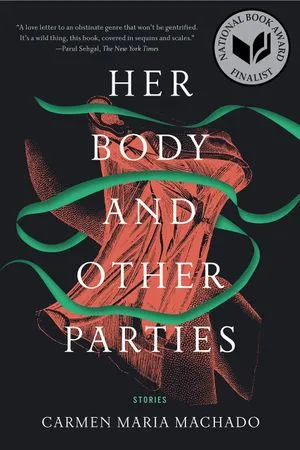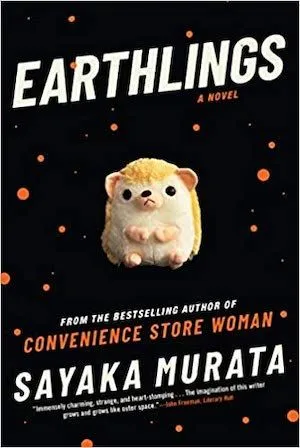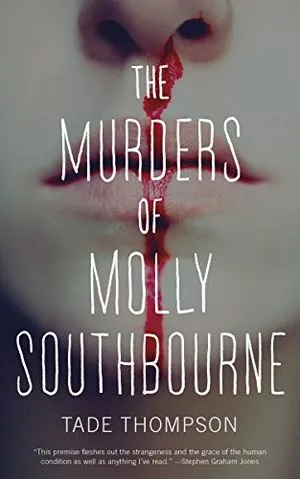
A Book for Every Song on Mother Mother’s O MY HEART
From ‘Hayloft’ to ‘Burning Pile’, the iconic tracks on Mother Mother’s album O My Heart have seen a resurgence online, flooding Instagram Reels and TikTok videos with love from a new group of fans. The album itself was originally released in 2008 and my first encounter with it was uploading songs like ‘Arms Tonite’ onto thematic Les Misérables character playlists in the days of 8tracks. Now, you can hear these songs in short skits about anime protagonists undermining their villains unexpectedly, or as part of YouTube compilations of tunes that your literary antagonist would croon over while balancing their mission for evil with their burgeoning romantic feelings for Y/N.
I don’t think the popularity is surprising; the album is packed with bass lines and vocals that get under your skin, and lyrics that speak to dissatisfaction with oneself, with our attempts at trying and failing to get things right or pretty, a general disconnection from expected norms and how that can be both freeing and nightmarish. Following a year dominated by dislocation – from friends and the outside world, and maybe even ourselves – I think it is no wonder that O My Heart has become so resonant yet again.
But, which book should you read based on your favourite song on O My Heart? Scroll through and find out!
O My Heart

Banana Fish by Akimi Yoshida
The opening track on the album creates the atmosphere that will continue through the rest of the record, edgy guitars and a gently pleading tone of voice that sings of difficulty with connecting. The lyrics chart the course of an unpredictable and frustrating heart, the coldness that the singer feels is hard to overcome and the struggle to find solid love, as well as the tinge of darkness that permeates such an approach to relationships.
Yoshida’s genre-busting manga Banana Fish is the perfect parallel to this song, as it follows the dynamic between a teen American gang leader and a Japanese journalist who are unexpectedly embroiled in the hunt for clues about a mysterious drug called Banana Fish. Action scenes aside, it’s primarily a narrative about finding genuine connections with others, and overcoming the past trauma of your life that may have lead you to become cold or generally uncertain about what love or friendship involves; what is real loyalty when you have lived looking over your shoulder to see if your ‘friends’ will betray you to the powerful? What is real love when you have been hurt and turned into a tool for others to use, not care for? Banana Fish is an intimate and tense exploration of what happens when the unsteady foundations of our hearts are challenged or unsettled even more.
Burning Pile

Riot Baby by Tochi Onyebuchi
Brooding and struck through with violence, this song is a strangely relieving song about finding strength in watching your troubles go up in flames you made and enjoy the warmth of it, at last finding a glow of light in an otherwise morbid, dark time that gutted you. The singer imagines a way to free themselves from the traps and binds that rob them of opportunities, confine them within cycles of apathy and cruelty and depression, and succumbs to the realisation that there can be change and control if you light the right matches.
Riot Baby is a science fiction novella that similarly tackles the ways in which power can be controlled and utilised as it navigates solutions to ending systemic violence, oppression, and prejudice – specifically America’s oppression of Black people. Following a pair of siblings, one who is unjustly imprisoned and another who has god-like reality-warping superpowers, this short but impactful story uses its increasingly dystopian setting to weave a striking tale of family, destiny, and the fires that start revolutions.
Body of Years

Braised Pork by An Yu
Characteristically angsty, ‘Body of Years’ expresses the frustration of struggling to understand and reconcile with the past; keen to see it as a dead thing but still understanding that has remains that you could still cling to and build yourself up out of. No matter how much the singer wishes to surpass their old body, whether that be their physical self or collection of identities, they will always be tripping over the bones of what once was, all the way to the grave.
An appropriately moody and fabulist novel, Braised Pork follows a young Chinese woman who is dragged into the murky history of her family after her husband is found dead in the bath at their apartment. With only an intriguing drawing of a fish man as a clue to what prompted her husband’s apparent suicide, Jia Jia find that she cannot move forward without first submerging herself in the past, until she herself is sucked into a dark water world of doubt, pain, and terror for what lies beyond her traumatic present. A compelling and quiet novel that discusses the way the scars of our loved ones still haunt our own bodies, Yu’s debut is contemplative partner to this weary tune.
Try to Change
This Mournable Body by Tsitsi Dangarembga
Continuing to echo the overall themes of O My Heart, Mother Mother are at their most exhausted in this lamenting song about stagnancy and the inability to alter your circumstances. Repetitive and sluggish, the song accurately conveys the tired and demoralising experience of putting your whole heart and effort into making things different for yourself, but being pushed back into familiar and dissatisfying routines. How many times will it take before realising trying to change is in vain?
The protagonist of Tsitsi Dangarembga’s latest installment in the Nervous Conditions series, Tambudzai, is trying to change her life by seizing any opportunity she can for money and stability. However, the lingering violence of colonialism haunts and twists her home country of Zimbabwe, that may now be independent from British control, but struggles to find its feet. Tambudzai resents how capitalism keeps her crushed beneath its heel, how her culture is stripped to stereotypes in the interest in tourism, and wrestles with her love of her country as a result. As her mental health declines and she reunites with old family to heal, Tambudzai’s story explores how the opportunities for change are not freely available as a result of colonial, capitalist control, and how to cling to hope in an age of slow, sore recovery.
Wisdom
Nevada by Imogen Binnie
‘Wisdom’ is a wistful and anxious song about the consequences of neglecting advice and insulating oneself in bad choices as a means of feeling independent, while simultaneously not feeling good enough to overcome the patterns of recklessness you find yourself tumbling into. The singer bitterly comments on their lack of money and feeling useless in the world, as well as regret at ignoring the helping hands they were offered along the way, and now can only plea for a tip.
Imogen Binnie’s fantastic slice-of-life/coming-of-age novel, Nevada, is about a 20-something trans woman, Maria, who wants to keep living her punk lifestyle in New York with her girlfriend and bicycle and drugs, but clashes with the cold reality of rent, retail work, and relationship breakdowns. Maria’s internal dialogue about gender, sex, and work are compelling, hilarious, and relatable, and perfectly resonate with the self-deprecating vibes of ‘Wisdom’ as she does her best to resist what society wants of her while simultaneously hoping for things to make sense eventually.
Body

Her Body and Other Parties by Carmen Maria Machado
‘Body’ is an undeniable bop; an elegant and sinister demand for intangibility, to escape physicality and shed the skin that suffocates you. The insistent drums and soft chorus create a crashing sense of desperation as an appeal to make Frankenstein parts of the self is unanswered.
Twisted, grotesque, but beautiful, Machado’s short story collection Her Body and Other Parties is a gruesome anthology obsessed with cumbersome bodies, laden with patriarchal pain and morphed beyond recognition as a result. From retellings of fairytales to horrific scenes of fading women, this collection is a perfect tour of gothic femininity and how it can be robbed, reclaimed, or resurrected.
Ghosting

Alice Isn’t Dead by Joseph Fink
Sweet and soft, ‘Ghosting’ tells a tale of haunting, how we stick like spirits to the ones we love and the way we never really exorcise ourselves from people, even if we want to, or should. The singer attempts to linger, to influence, but must tentatively leave their sheets and move on to the next world, house, or person.
A novelisation of the podcast of the same name, Alice isn’t Dead is about Keisha, a young woman who becomes a truck driver to find her missing wife. Taking the strangest tour across America possible, Keisha encounters many morbid figures, including the Thistle Men, who consume and consume and consume. However, while escaping from these sinister fiends is a priority, the emotional engine of the novel is the exploration of Keisha’s feelings about her relationship to Alice; how Alice haunts her, even though she isn’t dead, and if you can still love someone even if you only remember their ghost.
Hayloft
Spring Awakening by Frank Wedekind
Finally, we reach the song on the album that has gone viral, the song with that unmistakable chant. Who knew that a song about young lovers being threatened with gun violence, when their tryst is exposed by one of their dads, could be so catchy? Infectious and tinged with an unhinged air, this ‘Hayloft’ gets under your skin and in your head in seconds, and speaks tauntingly about horror and threat as though it doesn’t have a care in the world.
Frank Wedekind’s tense exploration of the ways in which the control of language and understanding, by overbearing parental figures and, by extension, general society, dooms the younger generation, is a fantastic parallel for this track on the album. Attempts to learn more about sex, adolescence, and how to navigate the terse world of grown-ups are met, in this book, with violent reprimands, death, and fear as a group of school friends struggle to comprehend their place in the world. The underlying angst and feelings of confinement are rife throughout this story as communication fails and all these teenagers can do is run from the inevitable chaos of their ignorance.
Wrecking Ball
Death Note by Tsugumi Obha and Takeshi Obata
Dissonantly upbeat and positive, ‘Wrecking Ball’ is a chipper, vaguely honky-tonk manifesto for a downward spiral into madness. Casually crooning about the determination needed to be the battering ram that artistically dismantles the fragile structure of society, and the pure delight of seeing the wreckage beneath you, this song is perfect for those villain playlists.
It’s also the perfect companion to Death Note, the famous supernatural thriller about Light Yagami, who uses the opportunities provided by the eponymous diary to wipe the world of evil; at least at the beginning. Light is a fascinating antihero – or, as the series progresses, villain – because of his illusions of grandeur, the belief that he is better, more evolved, than everyone else around him and therefore worthy of the divine right to choose who lives, dies, or bows to his will. Light, the fist amidst the hands, is less reckless than the titular wrecking ball of the song, but the glee he takes in his poetic justice makes this manga a great embodiment of Mother Mother’s prideful cry for destruction.
Arms Tonite

Wuthering Heights by Emily Brontë
A cackling, dizzy song about the rush of death – whether literal or in reference to ‘la petite mort’ – and the yearn to return to the arms of a loved one, this song is an impish tune that marries Gothic haunting with enduring, enthusiastic affection.
Similarly grim and wistful, Brontë’s Wuthering Heights is a novel whose central romance might have you grimacing and raising concerned eyebrows, much like the commentary in ‘Arms Tonite’ about dying in front of someone being adorable might. It’s a troubling and ensnaring book about ghosts and the passion of haunting, privilege, and two conflicting families clashing over moody English moors – what other classic tale could capture the dysfunctional, yet controversially romantic, atmosphere of Mother Mother’s brand of love?
Miles
Earthlings by Sayaka Murata
A song that evokes the trudge towards uncertain hope, ‘Miles’ is dominated by the steady beat of self-reassurance as the singer repeatedly claims that they are going to make it, to wherever that is, and the rest and easiness that awaits on the horizon. Despite the affirming lyrics that a restful life awaits beyond the curve of the road, there’s a lingering sadness here, that immediately casts the dreams for a break in delirious doubt; I don’t think the miles and miles are going to end, or at least not anywhere good.
A masterpiece of horror that contrasts the beauty of imagination with the gore of reality, Murata’s latest novel translated into English is a grim and stunning portrayal of one young woman’s pursuit of freedom from the terrors of her world. Long-ignored victim of assault and neglect Natsuki believes that she is an alien with Sailor Moon–style superpowers and a talking animal companion, who persuades her to take control of her fate and escape ‘The Factory’, defeat evil witches, and contact her mothership – by any means necessary. A lovely fit for this song’s idealistic, but implicitly impossible, hopes, Earthlings is an achingly sad and shocking tale of what lies at the end of those miles and miles of Natsuki’s trudge towards happiness; what does it mean to ‘take it easy’ when you’re not an Earthling? I highly encourage you to look at trigger/content warnings for this one before finding out.
Sleep Awake
The Murders of Molly Southbourne by Tade Thompson
The final song on O My Heart is a paranoid insight into the concerns of someone keen to protect what they love, but is always on high alert for incoming, inevitable, danger. Despite the soft, waltzing instrumental, the lyrics are an insomniac’s nightmare; no comfort can come when you are constantly looking over your shoulder, prepared to flee or shoot at the first flicker of threat.
Tade Thompson’s short sci-fi novella The Murders of Molly Southbourne is a bizarre and complex story following the eponymous Molly, who has been trained her whole life to kill evil doubles of herself that pop up out of nowhere whenever she sheds blood. As she grows up and begins a vicious hunt for the truth about her condition, Molly is further isolated from relationships and the world as her unique disposition threatens to consume more than just her own sense of self. Unable to settle, unable to rest, Molly’s development into a living weapon, prime to strike down another living being at the slightest drop of blood, sapped of the potential for a quiet life, easily parallels the hyper-vigilance of this closing track.
Looking for more books inspired by your music tastes? Check out our recommendations for books like Taylor Swift’s Evermore or take a listen to our cultivated playlist of songs that will be sure to match your reading mood.








